Analysis of Expectancy Theory and Employee Motivation in Organizations
VerifiedAdded on 2022/08/15
|6
|857
|18
Report
AI Summary
This report provides an analysis of Victor Vroom's Expectancy Theory, a prominent theory in organizational behavior that focuses on employee motivation. The report examines the core components of the theory, including expectancy, instrumentality, and valence, and how they interact to influence an employee's motivation levels. It explores how employees evaluate potential outcomes and make choices to maximize pleasure and minimize pain. The analysis highlights the theory's implications for job roles, emphasizing the importance of aligning individual expectations with organizational goals to enhance performance and job satisfaction. The report concludes that organizations can increase employee trust and achieve better outcomes by understanding and addressing employee needs, potential, and efforts. The report also references key studies and findings to support its arguments.
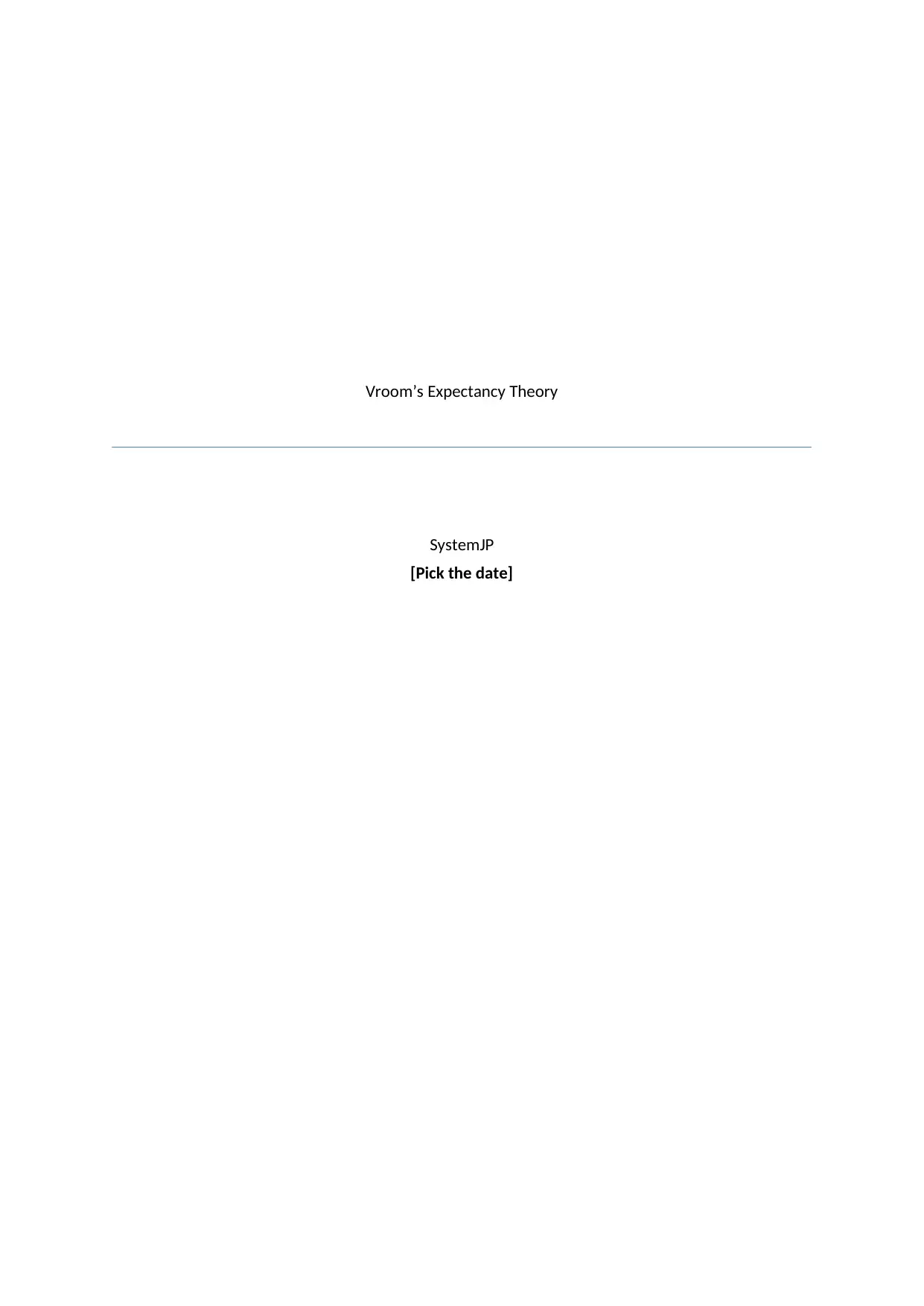
Vroom’s Expectancy Theory
SystemJP
[Pick the date]
SystemJP
[Pick the date]
Paraphrase This Document
Need a fresh take? Get an instant paraphrase of this document with our AI Paraphraser
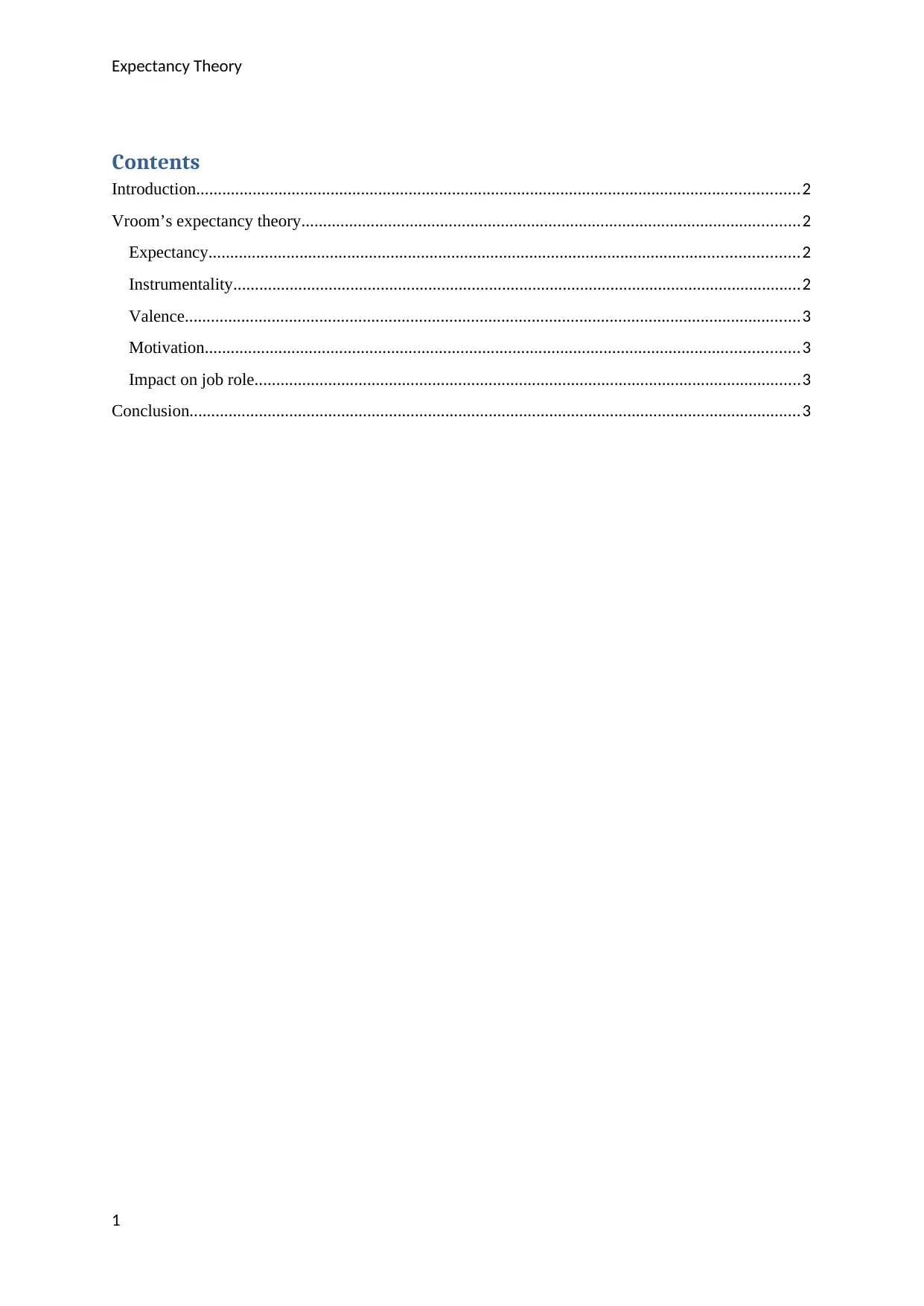
Expectancy Theory
Contents
Introduction...........................................................................................................................................2
Vroom’s expectancy theory...................................................................................................................2
Expectancy........................................................................................................................................2
Instrumentality...................................................................................................................................2
Valence..............................................................................................................................................3
Motivation.........................................................................................................................................3
Impact on job role..............................................................................................................................3
Conclusion.............................................................................................................................................3
1
Contents
Introduction...........................................................................................................................................2
Vroom’s expectancy theory...................................................................................................................2
Expectancy........................................................................................................................................2
Instrumentality...................................................................................................................................2
Valence..............................................................................................................................................3
Motivation.........................................................................................................................................3
Impact on job role..............................................................................................................................3
Conclusion.............................................................................................................................................3
1
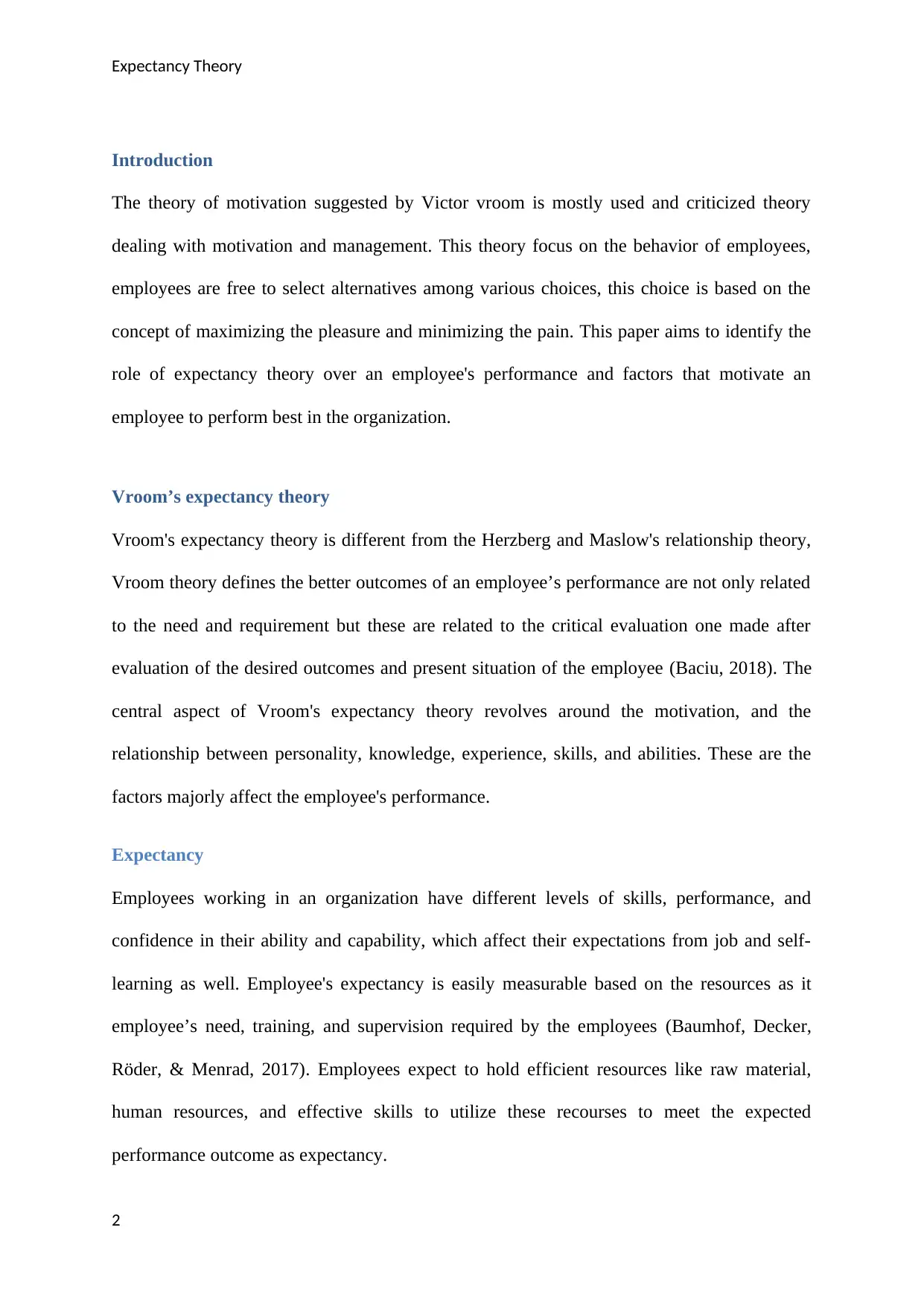
Expectancy Theory
Introduction
The theory of motivation suggested by Victor vroom is mostly used and criticized theory
dealing with motivation and management. This theory focus on the behavior of employees,
employees are free to select alternatives among various choices, this choice is based on the
concept of maximizing the pleasure and minimizing the pain. This paper aims to identify the
role of expectancy theory over an employee's performance and factors that motivate an
employee to perform best in the organization.
Vroom’s expectancy theory
Vroom's expectancy theory is different from the Herzberg and Maslow's relationship theory,
Vroom theory defines the better outcomes of an employee’s performance are not only related
to the need and requirement but these are related to the critical evaluation one made after
evaluation of the desired outcomes and present situation of the employee (Baciu, 2018). The
central aspect of Vroom's expectancy theory revolves around the motivation, and the
relationship between personality, knowledge, experience, skills, and abilities. These are the
factors majorly affect the employee's performance.
Expectancy
Employees working in an organization have different levels of skills, performance, and
confidence in their ability and capability, which affect their expectations from job and self-
learning as well. Employee's expectancy is easily measurable based on the resources as it
employee’s need, training, and supervision required by the employees (Baumhof, Decker,
Röder, & Menrad, 2017). Employees expect to hold efficient resources like raw material,
human resources, and effective skills to utilize these recourses to meet the expected
performance outcome as expectancy.
2
Introduction
The theory of motivation suggested by Victor vroom is mostly used and criticized theory
dealing with motivation and management. This theory focus on the behavior of employees,
employees are free to select alternatives among various choices, this choice is based on the
concept of maximizing the pleasure and minimizing the pain. This paper aims to identify the
role of expectancy theory over an employee's performance and factors that motivate an
employee to perform best in the organization.
Vroom’s expectancy theory
Vroom's expectancy theory is different from the Herzberg and Maslow's relationship theory,
Vroom theory defines the better outcomes of an employee’s performance are not only related
to the need and requirement but these are related to the critical evaluation one made after
evaluation of the desired outcomes and present situation of the employee (Baciu, 2018). The
central aspect of Vroom's expectancy theory revolves around the motivation, and the
relationship between personality, knowledge, experience, skills, and abilities. These are the
factors majorly affect the employee's performance.
Expectancy
Employees working in an organization have different levels of skills, performance, and
confidence in their ability and capability, which affect their expectations from job and self-
learning as well. Employee's expectancy is easily measurable based on the resources as it
employee’s need, training, and supervision required by the employees (Baumhof, Decker,
Röder, & Menrad, 2017). Employees expect to hold efficient resources like raw material,
human resources, and effective skills to utilize these recourses to meet the expected
performance outcome as expectancy.
2
⊘ This is a preview!⊘
Do you want full access?
Subscribe today to unlock all pages.

Trusted by 1+ million students worldwide
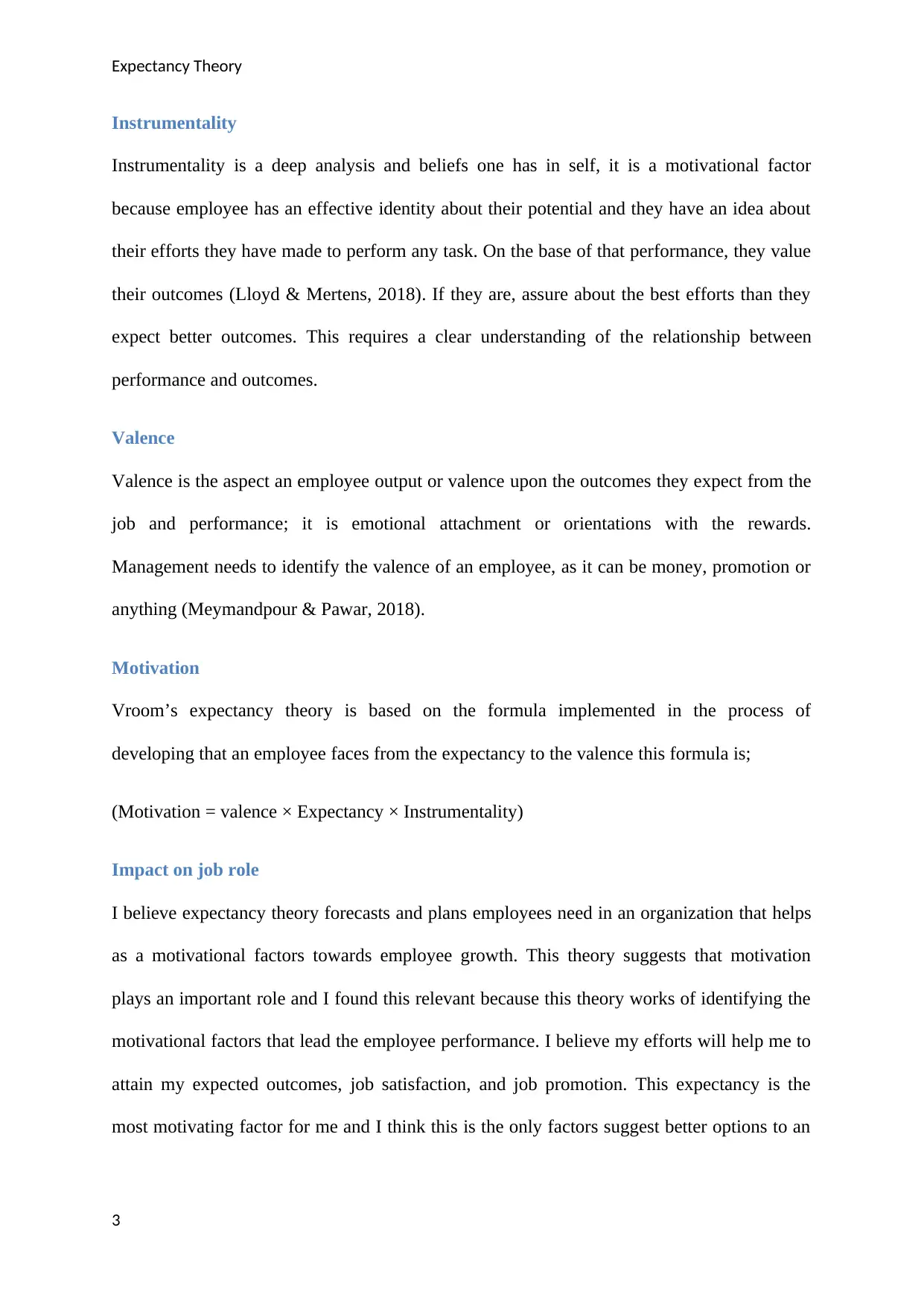
Expectancy Theory
Instrumentality
Instrumentality is a deep analysis and beliefs one has in self, it is a motivational factor
because employee has an effective identity about their potential and they have an idea about
their efforts they have made to perform any task. On the base of that performance, they value
their outcomes (Lloyd & Mertens, 2018). If they are, assure about the best efforts than they
expect better outcomes. This requires a clear understanding of the relationship between
performance and outcomes.
Valence
Valence is the aspect an employee output or valence upon the outcomes they expect from the
job and performance; it is emotional attachment or orientations with the rewards.
Management needs to identify the valence of an employee, as it can be money, promotion or
anything (Meymandpour & Pawar, 2018).
Motivation
Vroom’s expectancy theory is based on the formula implemented in the process of
developing that an employee faces from the expectancy to the valence this formula is;
(Motivation = valence × Expectancy × Instrumentality)
Impact on job role
I believe expectancy theory forecasts and plans employees need in an organization that helps
as a motivational factors towards employee growth. This theory suggests that motivation
plays an important role and I found this relevant because this theory works of identifying the
motivational factors that lead the employee performance. I believe my efforts will help me to
attain my expected outcomes, job satisfaction, and job promotion. This expectancy is the
most motivating factor for me and I think this is the only factors suggest better options to an
3
Instrumentality
Instrumentality is a deep analysis and beliefs one has in self, it is a motivational factor
because employee has an effective identity about their potential and they have an idea about
their efforts they have made to perform any task. On the base of that performance, they value
their outcomes (Lloyd & Mertens, 2018). If they are, assure about the best efforts than they
expect better outcomes. This requires a clear understanding of the relationship between
performance and outcomes.
Valence
Valence is the aspect an employee output or valence upon the outcomes they expect from the
job and performance; it is emotional attachment or orientations with the rewards.
Management needs to identify the valence of an employee, as it can be money, promotion or
anything (Meymandpour & Pawar, 2018).
Motivation
Vroom’s expectancy theory is based on the formula implemented in the process of
developing that an employee faces from the expectancy to the valence this formula is;
(Motivation = valence × Expectancy × Instrumentality)
Impact on job role
I believe expectancy theory forecasts and plans employees need in an organization that helps
as a motivational factors towards employee growth. This theory suggests that motivation
plays an important role and I found this relevant because this theory works of identifying the
motivational factors that lead the employee performance. I believe my efforts will help me to
attain my expected outcomes, job satisfaction, and job promotion. This expectancy is the
most motivating factor for me and I think this is the only factors suggest better options to an
3
Paraphrase This Document
Need a fresh take? Get an instant paraphrase of this document with our AI Paraphraser
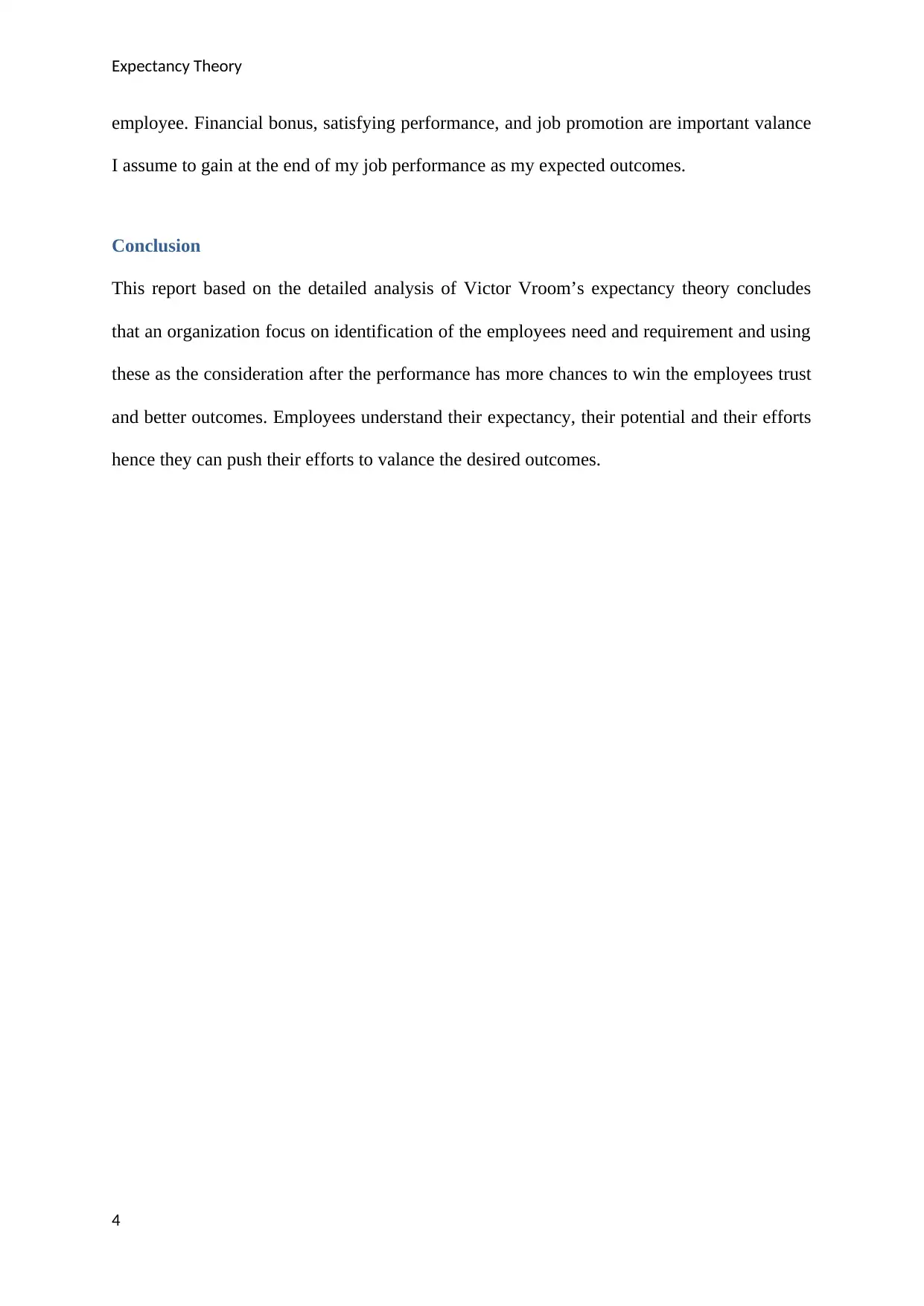
Expectancy Theory
employee. Financial bonus, satisfying performance, and job promotion are important valance
I assume to gain at the end of my job performance as my expected outcomes.
Conclusion
This report based on the detailed analysis of Victor Vroom’s expectancy theory concludes
that an organization focus on identification of the employees need and requirement and using
these as the consideration after the performance has more chances to win the employees trust
and better outcomes. Employees understand their expectancy, their potential and their efforts
hence they can push their efforts to valance the desired outcomes.
4
employee. Financial bonus, satisfying performance, and job promotion are important valance
I assume to gain at the end of my job performance as my expected outcomes.
Conclusion
This report based on the detailed analysis of Victor Vroom’s expectancy theory concludes
that an organization focus on identification of the employees need and requirement and using
these as the consideration after the performance has more chances to win the employees trust
and better outcomes. Employees understand their expectancy, their potential and their efforts
hence they can push their efforts to valance the desired outcomes.
4
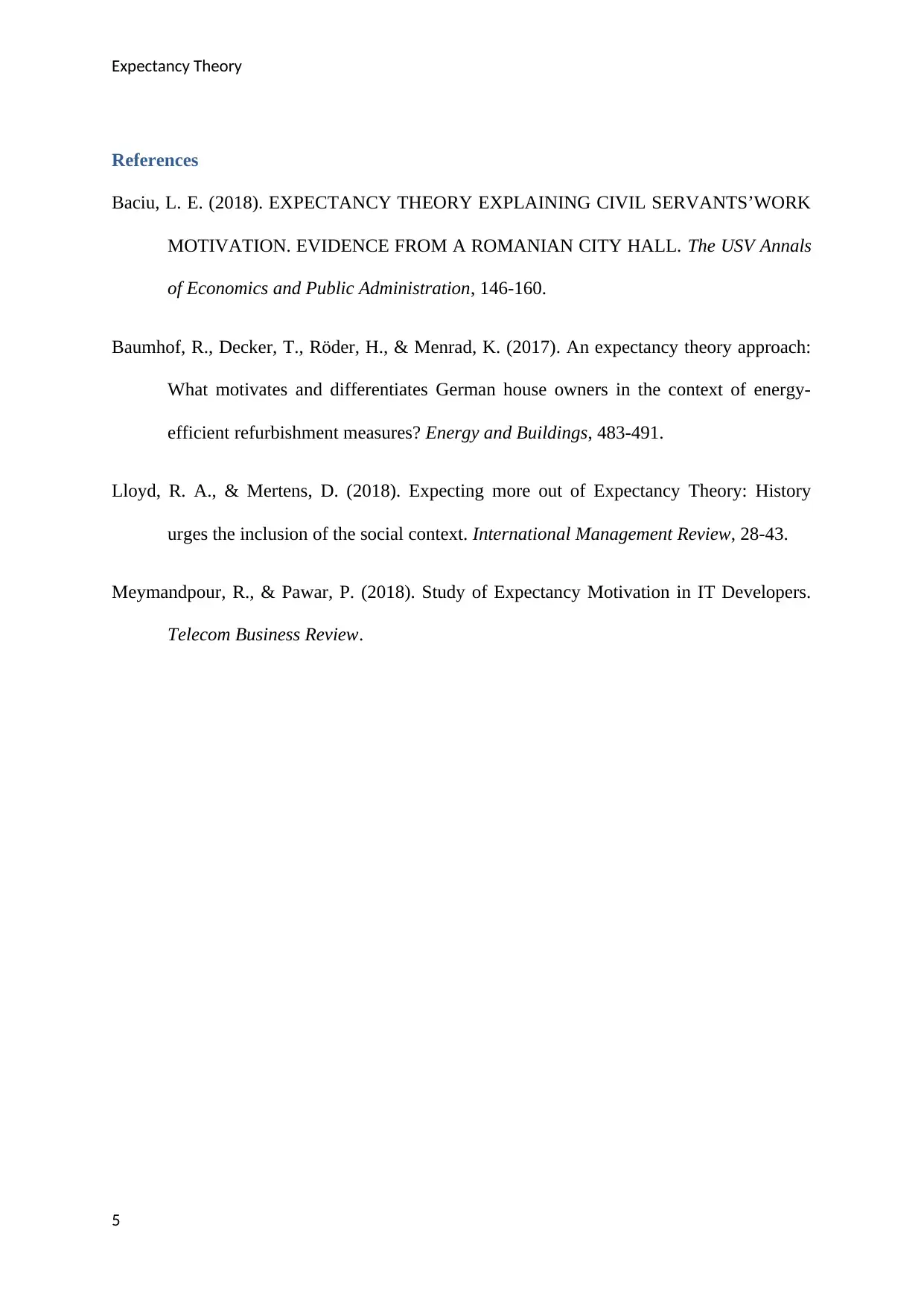
Expectancy Theory
References
Baciu, L. E. (2018). EXPECTANCY THEORY EXPLAINING CIVIL SERVANTS’WORK
MOTIVATION. EVIDENCE FROM A ROMANIAN CITY HALL. The USV Annals
of Economics and Public Administration, 146-160.
Baumhof, R., Decker, T., Röder, H., & Menrad, K. (2017). An expectancy theory approach:
What motivates and differentiates German house owners in the context of energy-
efficient refurbishment measures? Energy and Buildings, 483-491.
Lloyd, R. A., & Mertens, D. (2018). Expecting more out of Expectancy Theory: History
urges the inclusion of the social context. International Management Review, 28-43.
Meymandpour, R., & Pawar, P. (2018). Study of Expectancy Motivation in IT Developers.
Telecom Business Review.
5
References
Baciu, L. E. (2018). EXPECTANCY THEORY EXPLAINING CIVIL SERVANTS’WORK
MOTIVATION. EVIDENCE FROM A ROMANIAN CITY HALL. The USV Annals
of Economics and Public Administration, 146-160.
Baumhof, R., Decker, T., Röder, H., & Menrad, K. (2017). An expectancy theory approach:
What motivates and differentiates German house owners in the context of energy-
efficient refurbishment measures? Energy and Buildings, 483-491.
Lloyd, R. A., & Mertens, D. (2018). Expecting more out of Expectancy Theory: History
urges the inclusion of the social context. International Management Review, 28-43.
Meymandpour, R., & Pawar, P. (2018). Study of Expectancy Motivation in IT Developers.
Telecom Business Review.
5
⊘ This is a preview!⊘
Do you want full access?
Subscribe today to unlock all pages.

Trusted by 1+ million students worldwide
1 out of 6
Related Documents
Your All-in-One AI-Powered Toolkit for Academic Success.
+13062052269
info@desklib.com
Available 24*7 on WhatsApp / Email
![[object Object]](/_next/static/media/star-bottom.7253800d.svg)
Unlock your academic potential
Copyright © 2020–2026 A2Z Services. All Rights Reserved. Developed and managed by ZUCOL.





